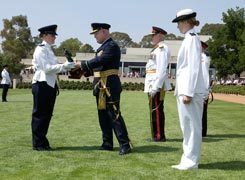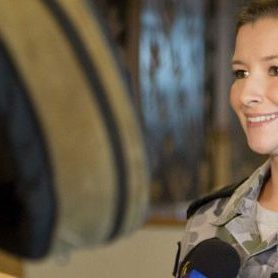 Strong evidence was found that Australian Defence Force Academy (ADFA) is making steady strides to improve its culture to build a more inclusive place for all members, including women
Strong evidence was found that Australian Defence Force Academy (ADFA) is making steady strides to improve its culture to build a more inclusive place for all members, including women
The Australian Human Rights Commission’s Audit Report of its Review into the Treatment of Women in the ADFA has found strong evidence that ADFA is changing and making steady strides to improve its culture to build a more inclusive place for all members, including women. Yet, it has also identified the need for continuing work in a small number of areas where the Review’s recommendations have either not been implemented properly or at all.
Sex Discrimination Commissioner, Elizabeth Broderick said the Australian Defence Force had agreed to implement 30 recommendations in full and one in principle, contained in the Commission’s initial Report into the Treatment of Women in ADFA, released over 12 months ago.
The audit of the implementation was independent, comprehensive and forensic, seeking evidence of progress towards cultural change.
“Our audit found there has been significant progress in establishing the Residential Support Officers, or RSO program, which provides better supervision and information for residential cadets, particularly in the first years,” she said.
“ADFA has developed a comprehensive annual Unacceptable Behaviour Survey, which will enable comparisons to be drawn with other recruit and training establishments across Defence on issues such as sexual harassment, sexual misconduct and bullying – an invaluable tool for leadership to swiftly address issues and target action.”
Progress had also been made with respect to recommendations about complaints training, improved information systems and injury management.
However, Commissioner Broderick said the ongoing incidence of sexual harassment and sexual misconduct, including events like those involving cadets in recently alleged sexual initiation rituals, underscored the urgency for more attention to be directed to the development and implementation, with an expert provider, of an evidence-based sexual ethics program.
“The fact that the initiation matter was brought to light by RSOs who reported it to ADFA’s senior leadership demonstrates the importance, impact and effectiveness of the residential support program,” she said. “Nevertheless, proper sexual ethics training for all cadets would provide an effective primary prevention tool against unacceptable behaviour and sexual misconduct, and aid development of more mature understanding of sexual ethics.”
“Further consideration needs to be given to the direct and powerful impact of staff on the cadet experience and achievement of superior outcomes,” she said. ”The Commandant should have the right to veto staff selections and remove underperforming staff.”
Acknowledging it was unrealistic to expect cultural change of the scale envisioned by the recommendations to be fully achieved in 12 months, Ms Broderick said it was nevertheless a critical window in which real change can commence or stall.
Conmmissioner Broderick welcomed the establishment of the Sexual Misconduct Prevention and Response Office (SeMPRO) and the option of restricted reporting, both key recommendations of her Review into the treatment of women in the Australian Defence Force.
“These are ground-breaking changes which are about having a victim-centric approach and ensuring that a victim will get appropriate and sensitive support,” she said. “It will empower those who have felt powerless, it will restore resilience and it will give confidence to those who have suffered trauma.”
Commissioner Broderick also welcomed the ongoing role for the Australian Human Rights Commission in monitoring the implementation of Pathway to Change in Defence.
“This will build on our substantial work and our knowledge of Defence culture,” she said. “It will enable to us to provide independent advice and continue to work with the ADF to drive lasting reform.”


